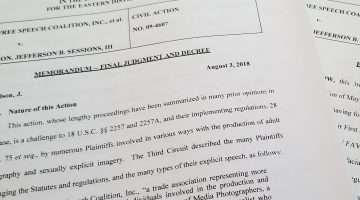 NEW YORK – William A. Price, a journalist who in 1955 defied a Senate subcommittee investigating communist infiltration of the newspapers, radio and television industries by refusing to answer questions and invoking the First Amendment instead of the Fifth, has died at the age of 94.
NEW YORK – William A. Price, a journalist who in 1955 defied a Senate subcommittee investigating communist infiltration of the newspapers, radio and television industries by refusing to answer questions and invoking the First Amendment instead of the Fifth, has died at the age of 94.
His obituary appeared in the New York Times this week, but has yet to appear in the New York Daily News, from which he was fired the same day he refused to testify.
Price has a Wikipedia page that tells the bare outlines of his life, how he worked as a police reporter for the Daily News from 1940-1955, flew planes for the Navy during World War II and was “one of many low-level, not-so-famous journalists to be fired and labeled as outcasts because of their alleged affiliations with the Communist Party.”
Of course, even the most thoughtful obituary can only begin to capture the full measure of a person’s life. In Price’s case, a long and detailed reminiscence posted to OpEdNews.com by a regular contributor named background n015e fills in a lot of the blank spaces and suggests a far more nuanced life than even that described by William Grimes of the Times.
It tells the story of a bona fide blue blood whose family was in the Social Register and could claim as ancestors two signatories to the Constitution, and whose experiences flying air-rescue operations in the Aleutian Islands during World War II changed his views about class and privilege for the rest of his life. It describes Price’s unerring ability to irritate superiors, whether military or civilian, in the service of what background calls “his penchant for social justice,” a predilection that never wavered even in the face of round-the-clock surveillance by the FBI.
Indeed, whoever background is, he (and we assume it is a male) claims to have known Price well and recalls anecdotes and conversations that happened years ago with a clarity and intimacy that testify to the truthfulness of the account. What emerges of Price is a man of utter integrity and bravery, whose inability to live a life built on lies determined just about everything that happened to him throughout his life, both good and bad.
The account must be read in its entirety to appreciate the writing and the subject, but here’s a snippet to whet the appetite:
“Bill was a rabble-rouser. That phone tap thing? The FBI didn’t just tap his phone. They tapped all the public pay phones in New York City for a five-block radius around his apartment on West 85th street. That’s a lot of pay phones. If you don’t know New York City, let me put it to you this way: that circle includes the Museum of Natural History. We’re talking A LOT of pay phones. Bill knew his phone was tapped for years. He didn’t need any special equipment to prove it. He simply stopped paying his phone bill. For years. And they never shut off his service even when he made long distance calls. His attitude was that since the FBI was listening in on all his calls he’d already paid for the service with his taxes, why pay twice?”









No Comment